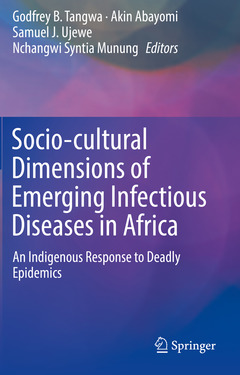Chapter 1: Introduction (Editors).- Part 1: Emerging Deadly Pathogens and Clinical Practice.- Chapter 2: How and Why the Global Emerging Pathogens Treatment Consortium was Created (Akin Abayomi & Diran Makinde).- Chapter 3: Deadly Emerging Pathogens: the Science and an Historical Overview (Felix I. Ikuomola).- Chapter 4: A blood component therapeutic strategy for Africa for routine and public health crises. The Science and Anthropology. (MagdyElkieby, SahrGevao, Thierry Burnouf, Godfrey Tangwa).- Part 2: Social Determinants of Emerging Infectious Diseases.- Chapter 5: Global Emerging Pathogens, Anthropology, Sociology and Culture (Morenike Ukpong & David Houeto).- Chapter 6: Global Emerging Pathogens and the Challenges of Science Education and Communication in Africa (Elizabeth Rasekoala ).- Chapter 7: Clinical Management of Lassa Fever in West Africa- Socio-Cultural Challenges (Godsent Chichebem Isiguzo and Micheal Iroezindu).- Chapter 8: Socio-Cultural and Economic Concerns and Considerations on the Use of Convalescent Blood or Plasma for the Management of Ebola Virus Disease and Similar Emerging Pathogens in Africa (Syntia, Godfrey David, Awa, Jennyfer, Akin).- Part 3: Global Health and Governance.- Chapter 9: Between the Science, Policy, Politics and Economics (Akin Abayomi, Titi Akosa& Obadiah Moyo).- Chapter 10: Global Emerging Pathogens and the (Prescriptive) Role of the World Health Organization (Godfrey B. Tangwa & Mohammed Afolabi).- Chapter 11: Global Emerging Pathogens, public health crises, global security and the role of the AU and universalization of international conventions (BWC and UN 1540) (Akin Abayomi, Rebecca Katz and Scott Spence).- Chapter 12: Novel Pathogens and North-South Cooperation (Nchangwi Munung & Odile O. O. Oukem-Boyer).- Chapter 13: Africans in the diaspora: What is our role? (Ken Ugwu, Makeda and Lungi).- Part 4: Ethics and Policy in the Context of EID.- Chapter 14: Justice, Human Rights and the Problems of Pandemics and Epidemics in Sub-Saharan Africa (Frank A. Abumere).- Chapter 15: Scientific Response to Deadly Novel Epidemics: The Role of Ethics and Good Clinical Practices (Francis Kombe & Jennyfer Ambe).- Chapter 16: Context and Ethical Challenges During the Last Ebola Outbreak in West Africa (Jennyfer Ambe and Francis Kombe).- Chapter 17: Insufficiency of Pathogen Focused Approaches for Managing Deadly Infectious Diseases in Africa: Harmonising the Roles of Governments, Health Systems and Populations (Samuel J. Ujewe & Alice Mungwa).- Chapter 18: African Dynamics in Public Health Ethics: Towards Inclusive Ethical Standards for Future Epidemics (Samuel J Ujewe).- Chapter 19: Global Emerging Pathogens and Poverty: An Ethical Analysis (Chi Primus Che and Mbih Jerome Tosam).- Part 5: Narratives from the 2014 Ebola Epidemic in West Africa.- Chapter 20: In and Out of the Laboratory: How Sierra Leone, Liberia and Guinea Coped with the Ebola Epidemic 2014-2015 (SahrGeevao, Brian Conton, Jerry Brown).- Chapter 21: Beyond mere Statistics: Case Studies from the Field during the Ebola Epidemic in West Africa (Jennyfer Ambe, Nchangwi Munung).- Chapter 22: Lagos the metropolis mega city:How the Mega-City of Lagos Handled an Outbreak of the Ebola Disease (Jide Idris and Adesina Fagbenro).




